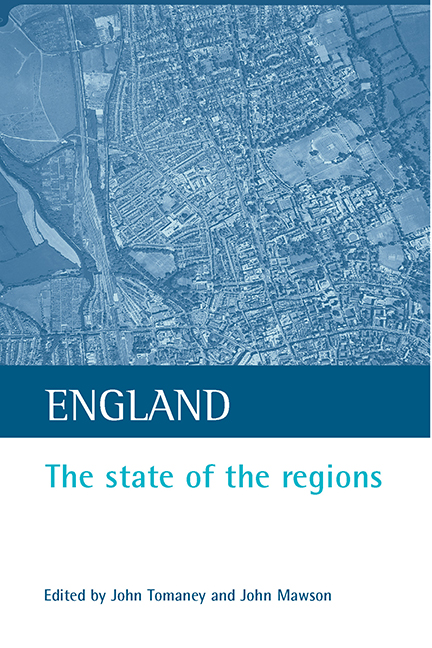Book contents
- Frontmatter
- Contents
- List of tables and figures
- Acknowledgements
- List of contributors
- one Introduction
- two Regional government in England: reviewing the evidence base
- three New Labour and the evolution of regionalism in England
- four Yorkshire (and the Humber)
- five Institutional collaboration in the West Midlands region
- six England's North West
- seven The South West
- eight Regionalism in the East of England
- nine The South East region?
- ten Regionalism in North East England
- eleven Regional strategy development in the East Midlands
- twelve The problem of regional governance
- thirteen Elected regional government: the issues
- fourteen Barnett plus needs: the regional spending challenge in Britain
- fifteen Conclusion: prospects for regionalism
- Index
- Also available from The Policy Press
eleven - Regional strategy development in the East Midlands
Published online by Cambridge University Press: 20 January 2022
- Frontmatter
- Contents
- List of tables and figures
- Acknowledgements
- List of contributors
- one Introduction
- two Regional government in England: reviewing the evidence base
- three New Labour and the evolution of regionalism in England
- four Yorkshire (and the Humber)
- five Institutional collaboration in the West Midlands region
- six England's North West
- seven The South West
- eight Regionalism in the East of England
- nine The South East region?
- ten Regionalism in North East England
- eleven Regional strategy development in the East Midlands
- twelve The problem of regional governance
- thirteen Elected regional government: the issues
- fourteen Barnett plus needs: the regional spending challenge in Britain
- fifteen Conclusion: prospects for regionalism
- Index
- Also available from The Policy Press
Summary
Introduction
In April 1999 the East Midlands Development Agency (EMDA) commenced operations, and discussions about the establishment of an East Midlands Regional Assembly (EMRA) were in full swing. The establishment of these two organisations has led to a great deal of change in the administrative structure and the nature of liaison between government and non-government organisations in the East Midlands. This chapter reviews some of the background activities that led to the creation of these two organisations. It describes how various organisations in the region were involved in shaping EMRA and EMDA, and how this process of consultation led to the creation of strategies to develop and shape the future of the region.
Unlike many other UK regions, regional thinking, liaison and strategies in the East Midlands were not well established prior to 1999. Many of the processes were therefore working with a blank sheet of paper that has enabled some interesting and significant activities to develop in the East Midlands that have not been observed elsewhere. This chapter examines current strategies and activities to promote regional development, first by examining the characteristics of the region and the resources available to the main strategic organisations. The second part of this chapter investigates the way in which institution building and liaison have taken place within the East Midlands. The third part examines the emergent approach to strategy development adopted by EMDA for regional development in conjunction with regional partners. The final part examines the Integrated Regional Strategy (IRS) approach developed by EMRA and the new forms of subregional partnership (SRP) that are being fostered to advance regional development.
The East Midlands
It is almost tradition that any examination of a region or the activities of regional administrative bodies has to include a review of the key characteristics of the region concerned. Far be it for this chapter to buck this trend. However, these figures can also be used to examine the magnitude of the regional development task facing the Government Office for the East Midlands (GOEM), EMRA or EMDA, particularly when considering the limited resources which they have to influence regional development.
- Type
- Chapter
- Information
- EnglandThe State of the Regions, pp. 147 - 158Publisher: Bristol University PressPrint publication year: 2002



